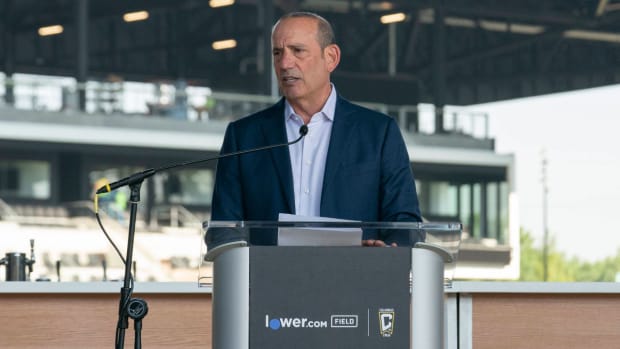MLS unveiled a new broadcast deal that will dramatically change how its matches are able to be consumed for the next decade.
Buoyed by the conviction that its fan base is younger, more global and more technologically savvy than that of more traditional pro sports leagues, Major League Soccer on Tuesday unveiled a 10-year media rights deal with Apple that’ll be anchored by a single, digital hub for all MLS, Leagues Cup and MLS Next Pro matches.
Speaking to Sports Illustrated on Tuesday, MLS commissioner Don Garber emphasized that the commitment isn’t a traditional broadcast arrangement, wherein a league exchanges the rights to its games and content for a negotiated rate. Rather, MLS and Apple have entered a partnership where each is incentivized to grow the business. Garber declined to reveal the economics (MLS reportedly was seeking up to $300 million annually), but he said the league will receive a base fee along with a percentage of subscription sales. Sports Business Journal reported that Apple’s guarantee to MLS will be $250 million per year. MLS and Apple will create a production studio, hire presenters and English-, Spanish- and French-speaking announcers, develop shoulder programming and produce a live whip-around show on Saturday nights.
“Think about Apple and what they've done to sort of be ubiquitous in our lives in ways that really matter to us with great products, with news and information, with music,” Garber said. “And when we were setting up what our new media strategy would look like … this idea of taking our local games, taking all of our games that traditionally were on linear networks, taking our games that we would sell globally, and then taking all the content that we're producing over the years … and aggregating all of that into one package and trying to deliver that to one partner that can make it easy for our fans to access everything that they love about the game.”

Jason Mowry/Icon Sportswire/Imago Images
Although the days of club-specific, regional broadcasts will end following the 2022 season, linear networks like ESPN, Fox or Univision are still in frame to negotiate a broadcast deal. Those games will be simulcast, however, by Apple. Local blackouts also will become a relic from the past.
Garber said the companies are still working on pricing and subscription options. The league said that 83% of its fans watch sports on a streaming device or recorded TV in a “typical week,” compared to 52% of the general population.
“This is going to be a natural evolution for our fans as they continue to migrate over to get the content that they want, and very importantly, we’ll have the ability to give them more content that they've ever been able to receive before because of the nature of the different services that are sitting on Apple TV,” Garber explained.
Here are some highlights of the deal:
— The dedicated digital platform will allow MLS to schedule matches at more regular and predictable times. Garber said there are 60 different start times across the 2022 season. From next year, MLS will schedule as many games as possible on Saturday nights, with occasional mid-week games on Wednesdays.
— Standard broadcast windows will include a 30-minute pregame show and postgame content. Club radio feeds will be available in addition to league broadcasters.
— MLS full-season ticket holders will receive a complementary subscription, and select games will be available to Apple TV+ subscribers at no additional cost.
— Content will be available on the Apple TV app on all Apple devices; Samsung, LG, Panasonic, Sony, TCL, VIZIO, and other smart TVs; Amazon Fire TV and Roku devices; PlayStation and Xbox gaming consoles; Chromecast with Google TV; Comcast Xfinity and on tv.apple.com.
— All broadcasts will be in 1080p.

John Rivera/Icon Sportswire/Imago Images
On average, the league’s ratings haven’t been good. National game broadcasts in 2021 averaged 285,000 viewers on ESPN, Fox and Univision, according to Sportico. That was a 3% increase from 2019, the league’s previous full season (the pandemic shortened the 2020 campaign.)
Those numbers didn’t deter Apple. Senior VP Eddy Cue told Sports Illustrated that the league’s growth, international appeal and relatively youthful fan base were enticing. The 10-year term affords room for long-term planning and potential innovation, and the more standardized schedule is designed to remove some confusion and inconsistency from the MLS experience.
“We think that together, with the innovations and things that we bring to the table, that it’s just going to be a much, much better experience for fans,” Cue said. “When you have a single partner like this, they’re able to do things and we’re able do things that you can’t do otherwise.”
Apple’s incentive to promote its new platform, and in turn the league, also might increase the audience in a way MLS failed to do as an afterthought on more traditional networks. That’s what Garber and the owners are hoping for, at least.
“This relationship is going to help us grow our fan base,” Garber said. “We're trying to build a global fan base. And to do that with a partner that's not just going to put a game on the air, but is going to work to be able to engage that fan through their unique understanding of content, of programming of technology. I mean, think of how they've transformed the music business. Think of how they've transformed the news business. And we're thinking that we could work with them to help transform our fan base so that ultimately, we can grow our audience.”
More Soccer Coverage: